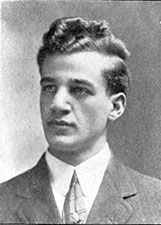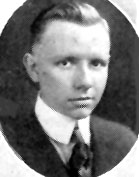|
The First World War |
|
The First World War |
| Lieutenant Earl Eugene Rahn
From Birdsboro, Pennsylvania, Lieutenant Rahn entered the College in 1909, He began his academic life in the Scientific course but then changed to the Philosophical course. An active and popular student, he participated in activities ranging from track, and drama, to Glee Club and debate. He wrote for the Dickinsonian and had a poem entitled "Fate" published in the 1915 Microcosm. In the most cruel of ironies, this poem deals with the possibility of early death. Rahn graduated as a Bachelor of Philosophy with his class of 1912. At the outbreak of war, he enlisted and took his officer training at Fort Oglethorpe, Tennessee before moving on to his unit at Columbia, South Carolina. His regiment was in France by mid 1918 and he was "struck down in youth" at Bois de Lar Rapp on October 18, 1918. |
 |
 |
James Wolcott Gooding
This member of the class of 1915 entered Dickinson in 1911 but had withdrawn in 1913. In the Great War, he enlisted in the U.S. Navy and died at Cape May, New Jersey. |
|
|
|
|
|
|
|